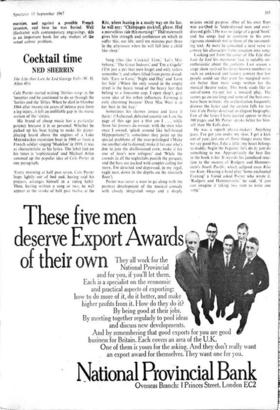Cocktail time
NED SHERRIN
Cole Porter started writing 'thirties songs in the 'twenties and he continued to do so through the 'forties and the 'fifties. When he died in October 1964 after twenty-six years of intense pain from a leg injury, it left an unfillable gap in the music section of the 'sixties.
His brand of cheap music has a particular potency because it is- so personal. Whether he picked up his beat trying to make his piano- playing heard above the engines of a Lake Maxinkuckee excursion boat in 1908 or from a French soldier singing 'Madelon' in 1919, it was as characteristic as his lyrics. The label tied on his tunes is 'sophisticated' and Michael Arlen summed up the popular idea of Cole Porter in one paragraph.
'Every morning at half past seven, Cole Porter leaps lightly out of bed and, having said his prayers, arranges himself in a riding habit. Then, having written a song or two, he will appear at the stroke of half past twelve at the
Ritz, where leaning in a manly way on the bar, he will say: "ChiMpagne cocktan,please. Had a marvellous ride this morning!" Tht statement gives him strength and confidence on which to suffer this, our life, until ten minutes past three in the afternoon when he will fall into a child like sleep.'
Song titles like 'Cocktail Time,' Let's Mis- behave,' The Great Indoors' and 'I'm a Gigolo' rim just a pet that men forget and only tailors remember'); and others lifted from penny dread- fuls; 'Easy to Love,' 'Night and Day' and 'Love for Sale' ('When the only sound in the empty street is the heavy tread of the heavy feet that belong to a lonesome cop, I open shop'), give some idea of his urban influences. Farming is only charming because 'Dear Mae West is at her best in the hay.'
Sometimes his rhymes amuse and leave it there: ('A cheated, defeated cocotte am Lon the page of this age just a blot am I . . . while those fat fenunes du monde, with the men who once I owned, splash around like hell-bound Hippopotami!'); sometimes they point up the special problems of the over-privileged ('Make me another old fashioned; make it for one who's due to join the disillusioned crew, make it for one of love's new refugees' and 'While the crowds in all the nightclubs punish the parquet, and the bars are packed with couples calling for more, I'm deserted and depressed, in my regal, eagle nest, down in the depths on the ninetieth floor').
Porter was never a man to go along with the postwar development of the musical comedy with closely integrated songs and a deeply
serious social purpose. (One of his own flops was ascribed to 'underdressed men and over- dressed girls.') He was no judge of a good 'book' and his songs had to conform to his own rigorous standards not to those of the surround- ing text. At most he conceded a neat verse to convey his characters from situation into song.
Looking out from the cover of The Life that Late he Led his marmoset face is suitably un- enthusiastic about the contents. Last season a stage show revived his lesser-known numbers in such an awkward and tawdry context that few people could see that even his marginal notes are better than most songs written for the musical theatre today. This book reads like an out-of-town try-out for a musical play. The scenes go on too long and none of the best ones have been written: the orchestration frequently drowns the lyrics and the curtain falls far too late. Cole Porter deserved an elegant biography. Few of the lyrics I have quoted appear in these 300 pages and Mr Porter speaks better for him- self than Mr Eel's does.
He was a superb phrase-maker: Anything goes; I've got you under my skin; I get a kick out of you; just one of those things; every time we say good-bye, I die a little; my heart belongs to daddy; begin the beguine; let's do it; you do something to me. Appropriately the best line in the book is his. It records his jaundiced reac- tion to the success of Rodgers and Hammer- stein's South Pacific, which eclipsed even Kiss me Kate. Hearing a band play 'Some enchanted Evening' a friend asked Porter who wrote it. `Rodgers and Hammerstein,' he said, 'if you can imagine it taking two men to write one song.'






























 Previous page
Previous page